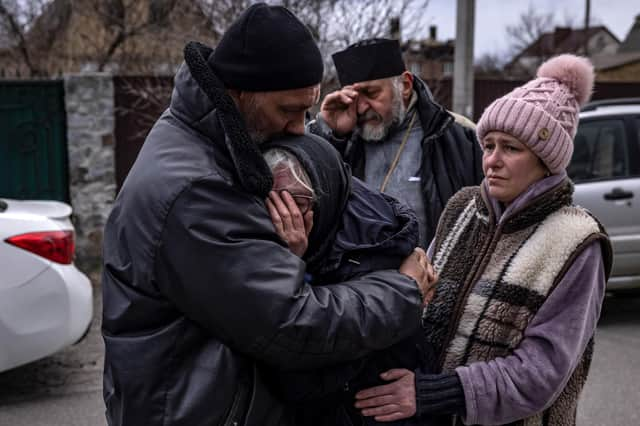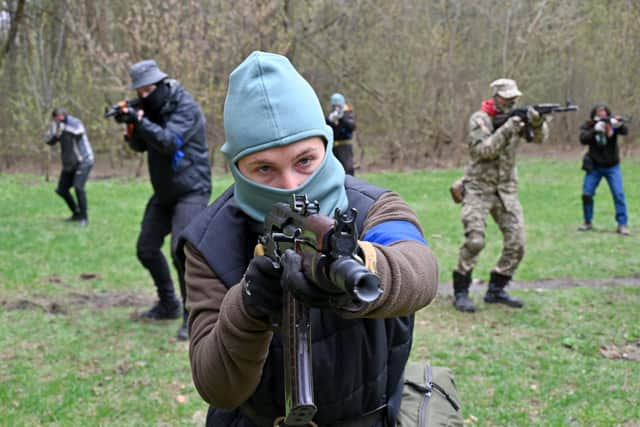Ukraine Russia war: Why many more Russians and Ukrainians may have to die before there is a chance of peace – Professor Peter Jackson


Both sides have suffered tens of thousands of military and civilian dead and the fighting has caused wholesale destruction in many of Ukraine’s largest cities.
At this point two things are clear. First, Russia cannot obtain its initial objective of regime change. Second, prospects for destroying Russian armed forces in Ukraine or evicting them entirely from Ukrainian territory remain remote for the foreseeable future. The war must eventually end in a negotiated settlement.
Advertisement
Hide AdAdvertisement
Hide AdBut such a settlement appears impossible in the short term. Russian president Vladimir Putin declared as recently as April 12 that talks between Russian and Ukrainian delegates, which had been ongoing for week, were “at a dead end”. Russia is instead marshalling its land and air forces for another major offensive against south-east Ukraine.
To get an idea of how long the war is likely to last, and what a peace settlement might look like, we need to consider the overall of objectives of the key actors in this war as they have evolved since fighting began in late February.
Russia launched its offensive with the aim of quickly seizing control of the Ukrainian government and state infrastructure. Putin’s stated aim to “de-nazify” Ukraine was shorthand for overthrowing the current pro-Western government and installing a much more pliant regime similar to that of Aleksander Lukashenko in Belarus.
Russia would thus assert its dominance over its two western neighbours and secure its western frontiers from any encroachment by political forces sympathetic to either the EU or Nato.


Many commentators have interpreted this operation as an initial step in an ambitious project to restore Russia to its past glory as a world power. Others see it as a move to bolster Russia’s security by creating a sphere of influence on its western marches.
What seems clear is that Putin’s larger aim was to deal a major blow to the US-dominated, post-Cold War, liberal international order. This order appeared ripe for dismantling in the aftermath of the unseemly retreat from Afghanistan, soaring energy prices and the ideological divisions laid bare by Brexit and the Trump presidency (divisions that Russian intelligence worked hard to intensify by any and all means at its disposal).
But this grand initiative has unquestionably failed, at least for the time being. The stellar performance of the Ukrainian political and military leadership has outstripped the projections of even the most optimistic western observers. Russian offensives in the north were first halted and then thrown back with heavy losses in personnel and matériel. Supposedly elite offensive units of the Russian army were decimated as operations were hamstrung by logistical difficulties and plummeting morale.
At the same time, key political and military institutions of the post-Cold War order such as the EU and Nato have, for the most part, maintained a remarkable outward unity. Economic sanctions of unprecedented reach and severity have been imposed on Russia. Ukraine, meanwhile, has received a steady and growing flow of military and intelligence assistance from the North Atlantic Alliance.
Advertisement
Hide AdAdvertisement
Hide AdRussia now faces a geo-strategic situation that is much worse than before it invaded Ukraine. Finland and Sweden now seem poised to apply for Nato membership, reversing a decades-long tradition of neutrality. In doing so, they are ignoring threats of dire strategic consequences to avail themselves of the security protection that comes with Nato membership.
In response, Russia has shifted the emphasis of its military operations to the south and east. This is clear evidence that Moscow has revised its core aims in the conflict. Putin’s objective is now to control and probably annex the Donbas region, the one-time heavy industry heartland of the former Soviet Union.
It is almost certain that Russia will also seek to seize control of Ukraine’s entire Black Sea littoral, extending from the northern tip of Luhansk province in the south-east to the crucial port of Odesa in the south-west. This would deprive Ukraine of the ability to export its foodstuffs and raw materials by sea.
Such a development would be a severe blow to one of the world’s largest grain exporters and blight the prospects of the Ukrainian economy for years to come. Russia would in this way ensure itself of a much weaker and more vulnerable neighbour on its western border. Yet the Kremlin appears to expect decisive results by May 9, Russia’s ‘Victory Day’.
This would require a much stronger performance from the Russian military than any realistic assessment of Russian capabilities could possibly envisage. Russian forces have still to overrun the port city of Mariupol after a siege of nearly seven weeks.
The situation is further complicated by the nature of Putin’s regime, another major obstacle to a negotiated settlement. Complete failure to achieve anything significant from this war would be an unthinkable blow to Putin’s standing as a strong man in charge of Russia’s destiny. This state of affairs creates uncertainty regarding the limits to which Russian power would go to secure a satisfactory outcome from this conflict.
What of Ukrainian objectives? From the moment peace talks began in earnest in mid-March, Ukraine has displayed a determination to preserve its sovereignty along with the integrity of its national territory.
These aims were tempered, however, by a stated willingness to be flexible over the question of its political alignment. President Volodymyr Zelensky demanded candidate status for membership in the EU but expressed a willingness to envisage permanent neutral status for Ukraine. Nato membership was taken off the table.
Advertisement
Hide AdAdvertisement
Hide AdBut evidence of Russian war crimes created an entirely new political context for negotiations with Russia. Atrocities committed against Ukrainian civilians have damaged Russia’s international standing and bolstered support for Ukraine, particularly in the West. Their chief effect has been to make Ukrainian concessions much more difficult.
This situation is only aggravated by the tendency of many western leaders to publicly label the Russian president a war criminal and characterise Russian policy in Ukraine as genocide. Such undiplomatic language has almost certainly hardened positions on both sides and thus diminished prospects for a compromise settlement of some kind in the near term.
Much will therefore depend on the outcome of military operations in the Donbas and along the Black Sea coast. This fighting will be at least as brutal as that seen in the northern cities of Kharkiv, Chernihiv, Sumy and Kyiv. Many more Russians and Ukrainians may have to die before there is a genuine prospect for an end to this war.
Professor Peter Jackson is director of the Scottish Council on Global Affairs
A message from the Editor:
Thank you for reading this article. We're more reliant on your support than ever as the shift in consumer habits brought about by coronavirus impacts our advertisers.
If you haven't already, please consider supporting our trusted, fact-checked journalism by taking out a digital subscription.
Comments
Want to join the conversation? Please or to comment on this article.
